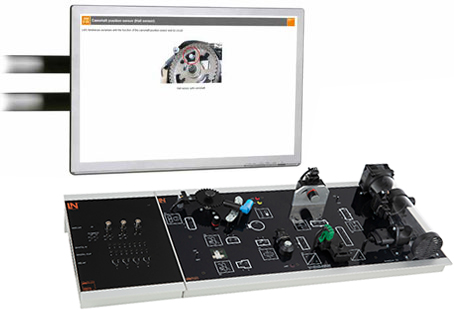Sensors in Motor Vehicles UniTrain Course
In modern motor vehicles more and more components are being monitored and controlled electronically. Sensors have several jobs to do, including the detecting of physical data and converting this information into electrical signals which can then be processed by control units. Trainees should be able to grasp how this process works and the effects different sensor stimuli have on these signals. This system allows students and trainees to learn and analyse the most essential aspects of this process.
- Instrumentation and process control technology
- Physical variables to be measured
- Induction
- Hall effect
- Piezo effect
- Semiconductors
- Absolute and relative pressure
- Inductive rpm sensors
- Hall-type speed sensors
- Throttle-valve position measurement with throttle valve switch
- Throttle-valve position measurement with throttle-valve potentiometer
- Air-flow measurement with hot-wire and hot film sensors
- Pressure measurement in the intake duct
- Detecting ignition timing with knock sensor
- Temperature measurement with NTC and PTC temperature sensor technology
- Fault simulation (8 simulated faults individually activated via relays)
Product: Sensors in Motor Vehicles UniTrain Course
Product Code: CO4204-7F

